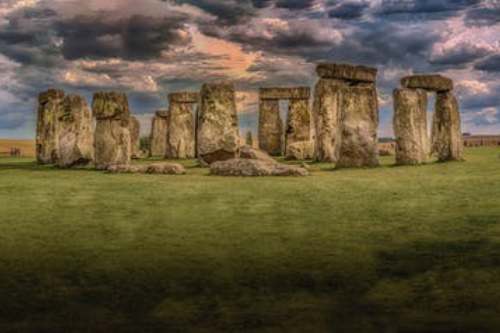The Psalmist describes “the blessed” as those who are made joyful with gladness in God’s presence, who know the joyful sound of the festal shout, and who walk in the light of His countenance. For our sakes, Christ was made sorrowful with the absence of His Father’s presence, He came to know the terrifying sound of judgment’s trumpet, and He hung in the darkness of God’s unbearable frowning countenance. Because of Adam’s fateful choice, the entire creation groaned under the curse and was enslaved to corruption and futility. To liberate creation, the Last Adam took upon Himself the sins of His people and groaned under the dreadful yoke.
“He redeemed us from the curse of the Law, having become a curse for us…”
It is the greatest travesty that the true meaning of the Christ’s “cry from the cross” has often been lost in romantic cliché. It is not uncommon to hear a preacher declare that the Father turned away from His Son because He could no longer bear to witness the suffering inflicted upon Him by the hands of wicked men. As we have learned, such interpretations are a complete distortion of the text and of what actually transpired on the Cross. The Father did not turn away from His Son because He lacked the fortitude to witness His sufferings, but because “He made Him who knew no sin to be sin on our behalf, so that we might become the righteousness of God in Him.” He laid our sins upon Him and turned away, for His eyes are too pure to approve evil and He cannot look upon wickedness with favor.

It is not without good cause that many Gospel tracts picture an infinite abyss or separation between a holy God and sinful man. With such an illustration, the Scriptures fully agree. As the prophet Isaiah cried out:
“Behold, the Lord’s hand is not so short that it cannot save, nor is His ear so dull that it cannot hear. But your iniquities have made a separation between you God and your God, and your sins have hidden His face from you so that He does not hear.”
According to this text, and countless others, all men should live and die separated from the favorable presence of God and under divine wrath. For this reason, the Son of God stood in our place, bore our sin, and died “forsaken of God.” For the breach to be closed and fellowship restored, “Was it not necessary for the Christ to suffer these things?”

Christ Suffers the Wrath of God
To obtain the salvation of His people, Christ suffered the terrifying abandonment of God, drank down the bitter cup of God’s wrath, and died a bloody death in the place of His people. Only then could divine justice be satisfied, the wrath of God be appeased, and reconciliation be made possible.
In the garden, Christ prayed three times for “the cup” to be removed from Him, but each time His will gave into that of His Father’s. We must ask ourselves, what was in the cup that caused Him to pray so fervently? What terrible thing did it contain to cause Him such anguish that His sweat was mingled with blood?
It is often said that the cup represented the cruel Roman cross and the physical torture that awaited Him. That Christ foresaw the cat of nine tails coming down across His back, the crown of thorns piercing His brow, and the primitive nails driven through His hands and feet. However those who believe these things to be the source of His anguish do not understand the Cross, nor what happened there. Although the tortures heaped upon Him by the hands of men were all part of God’s redemptive plan, there was something much more ominous that evoked His cry for deliverance.
In the first centuries of the primitive church, thousands of Christians died on crosses. It is said that Nero crucified them upside down, covered them with tar, and set them aflame to provide streetlights for the city of Rome. Throughout the ages since then, a countless stream of Christians have been led off to the most unspeakable tortures, and yet it is the testimony of friend and foe alike that many of them went to their death with great boldness. Are we to believe that the followers of the Messiah met such cruel physical death with joy unspeakable, while the Captain of their Salvation cowered in a garden, fearing the same torture? Did the Christ of God dread whips and thorns, crosses and spears, or did the cup represent a terror infinitely beyond the greatest cruelty of men?

To understand the ominous contents of the cup, we must refer to the Scriptures. There are two passages in particular that we must consider – one from the Psalms and the other from the Prophets:
“For a cup is in the hand of the LORD, and the wine foams; It is well mixed, and He pours out of this; surely all the wicked of the earth must drain and drink down its dregs.”
“For thus the LORD, the God of Israel says to me, ‘Take this cup of the wine of wrath from My hand and cause all the nations to whom I send you to drink it. They will drink and stagger and go mad because of the sword that I will send among them.’”
As a result of the unceasing rebellion of the wicked, the justice of God had decreed judgment against them. He would rightly pour forth His indignation upon the nations. He would put the cup of the wine of His wrath to their mouth and force them to drink it down to the dregs. The mere thought of such a fate awaiting the world is absolutely terrifying, yet this would have been the fate of all, except that the mercy of God sought for the salvation of a people, and the wisdom of God devised a plan of redemption even before the foundation of the world. The Son of God would become a man and walk upon the earth in perfect obedience to the Law of God.

He would be like us in all things, and tempted in all ways like us, but without sin. He would live a perfectly righteous life for the glory of God and for the benefit of His people. Then in the appoint time, He would be crucified by the hands of wicked men, and on that Cross, He would bear His people’s guilt, and suffer the wrath of God against them. The perfect Son of God and a true Son of Adam together in one glorious person would take the bitter cup of wrath from the very hand of God and drink it down to the dregs. He would drink until it was finished, and the justice of God was fully satisfied. The divine wrath that should have been ours would be exhausted upon the Son, and by Him, it would be extinguished.
Imagine an immense dam that is filled to the brim and straining against the weight behind it. All at once, the protective wall is pulled away and the massive destructive power of the deluge is unleashed. As certain destruction races towards a small village in the nearby valley, the ground suddenly opens up before it and drinks down that which would have carried it away. In similar fashion, the judgment of God was rightly racing toward every man. Escape could not be found on the highest hill or in the deepest abyss. The fleetest of foot could not outrun it, nor could the strongest swimmer endure its torrents. The dam was breached and nothing could repair its ruin. But when every human hope was exhausted, at the appointed time, the Son of God interposed. He stood between divine justice and His people. He drank down the wrath that we ourselves had kindled and the punishment we deserved. When He died, not one drop of the former deluge remained. He drank it all on our behalf!
